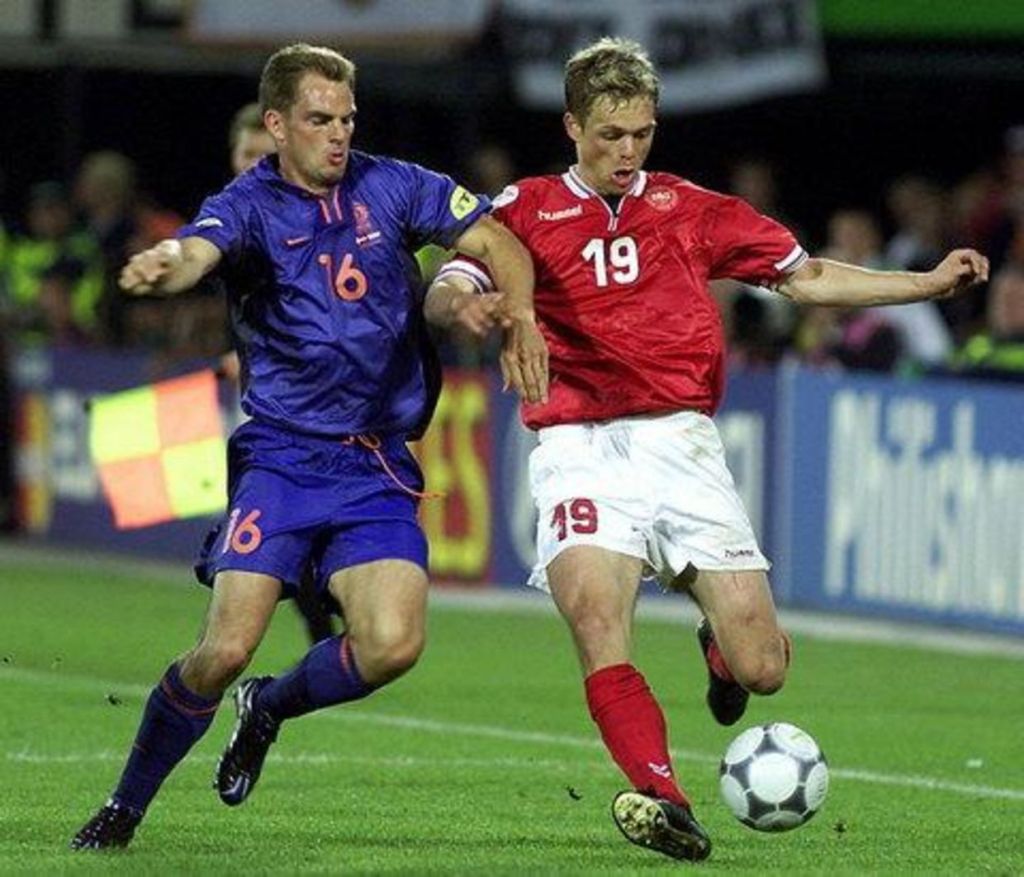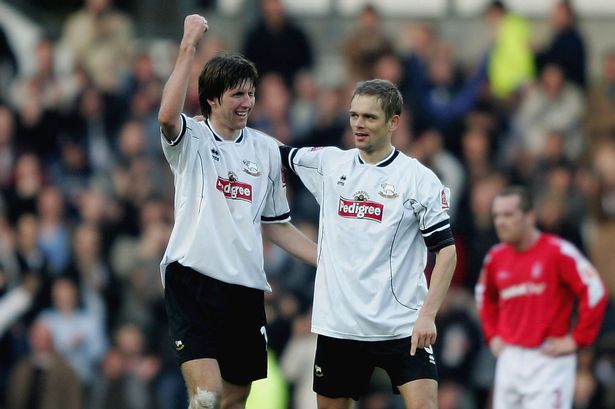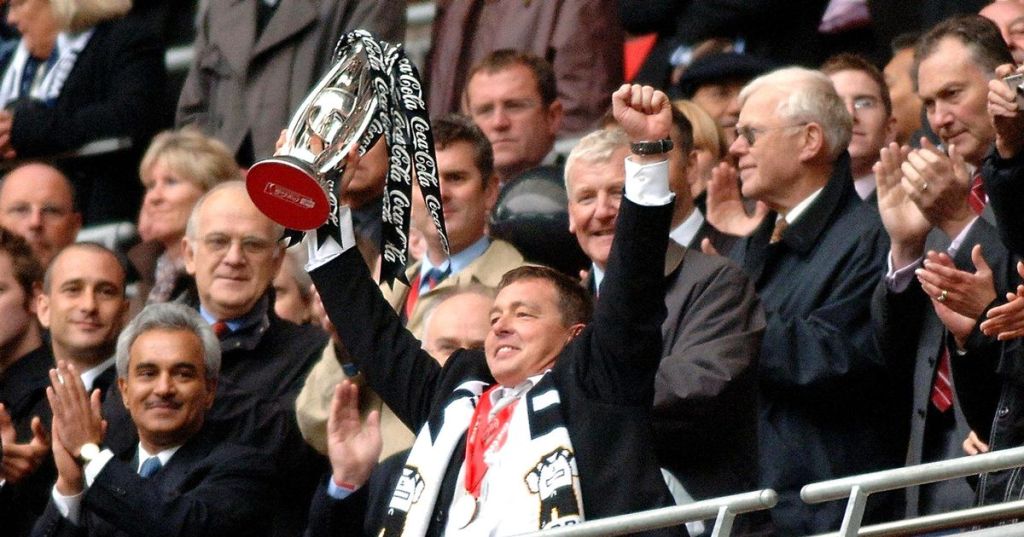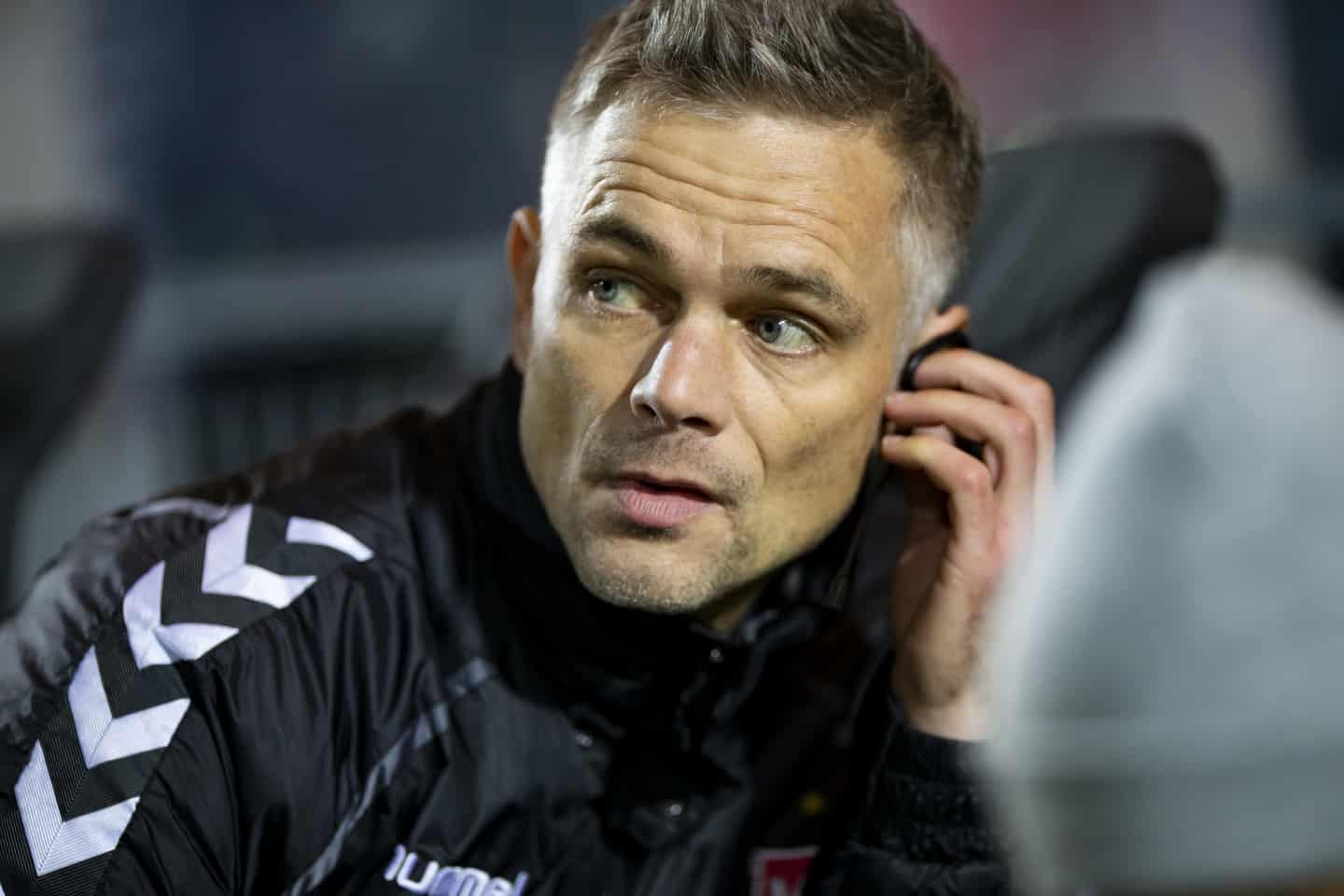You know those questions you end up asking your mates in the pub when you’ve truly run out of things to talk about? They usually have an answer, don’t they. If a tree falls in the forest and nobody is there to hear it, does it make a sound? ‘Probably, yeah.’ What happens after you die? ‘Reincarnated, maybe? Dunno pal.’ But there is one question for which there is no answer. One question which will leave even the most advanced mind unable to fathom a response: Why is the quality of the footage of Derby County in the mid-2000s so bad?
It truly is life’s biggest mystery. Because if you want to go back and enjoy the highlights of George Burley’s side in the 2004-05 season, you get this purply haze over the top. Or a yellow one. It means that you can’t properly reminisce over what was a pretty amazing campaign, albeit one that ended disappointingly. The following season and you get pretty much the same look, although you’re less likely to want to watch any of that campaign.
The point of this intro is that thousands of young supporters who missed out on the decade will never properly get to experience the resurgence of foreign excitement brought into Pride Park during the summer of 2004. They never experienced Idiakez, they never experienced Rasiak and they never experienced the third, perhaps forgotten man, Morten Bisgaard.
Bisgaard is the one who is often overlooked. Along with Marco Reich, he’s the name you don’t tend to hear come up too often. People remember the goals of Rasiak, particularly those against Forest. And for Idiakez, it’s impossible to erase his set piece genius from the mind. But Bisgaard didn’t necessarily have a ‘thing’ to recall all these years later. That didn’t mean he was any less important though.
“I just knew Jacob Laursen. I remember his free-kick goal against Peter Schmeichel!”
Entering Derbyshire off the back of the club’s most recent relegation battle, little was known or expected of these new imports. Idiakez had long blonde hair and a career in La Liga, Rasiak’s permit had been messed up by Siena and Bisgaard was from the Danish Superliga. “It was a big difference to Copenhagen!” laughs the Dane.
None of the trio had ever been to Derby before and if truth be told, none of them had properly heard of it. “Because I’m from ‘74, for me I just knew was Jacob Laursen, Paulo Wanchope. But mostly I remember Jacob Laursen’s free-kick goal against Peter Schmeichel. That was my only knowledge of the club.”
It was more than the other two knew of their new home, but it was only a tiny insight into what would become his new home. And although they were strangers to Derby, they knew the chance to come to England and play football was, as Bisgaard describes it, ‘a dream come true’. Had just one joined, it would no doubt have been daunting. But as three, it allowed the group to get closer and as Bisgaard had a grip on English, Inigo and his wife soon became regulars at the Bisgaard’s.

“With Morten it was good because Spanish and Italian you can understand things and he really helped me” recalls Idiakez. “We went out with families all the time together. It was all the time together. My wife came over and as a family the Bisgaard’s were very good. We were really together and he helped me to get involved with the team, even though we didn’t speak any English.”
Bisgaard was able to help both Idiakez and Rasiak integrate into their new club and their new home. For him, a move overseas was nothing new having made the switch to Udinese in 1998. “I didn’t know many players from the squad but signing Idiakez and Rasiak was important because I got close with them. Marco Reich too. It’s always been like that with central European guys and it was the same when I was at Udinese. But I had a lovely time with British people too – Paul Boertien especially, Richard Jackson too. Inigo and Rasiak and Tommy Smith, we had some talents!”
It took time but with George Burley finally allowed to build a squad capable of adapting to his style of play, the international influence began to transform the outlook of the entire club. A year earlier, Burley had been forced to call upon anyone and everyone in an attempt to steer away from the third division. Now, he had a permanent squad who gelled almost instantly. “I remember George Burley as a manager who liked us to play. Play short, with movement, he gave me a free role behind the striker which was the best position ever.
“For me, one time he criticised me for not making crosses so I had to adjust a little bit. I used to be a winger finding the crosses, so I had to adapt to British style. It was a lot less tactical than I was used to. We had a Swedish coach in Denmark and were given a lot of training with 442, how to defend, shifting from side to side. I don’t recall much in training it was more based on play. But I really enjoyed that first year, it went very well.”

Bisgaard would appear 41 times in his maiden English season, scoring four times. There was a goal in a 1-0 victory at Bramall Lane under the hammering rain, this coming after he, Idiakez and Rasiak all found the net against Stoke a week earlier. Along with Tommy Smith and Paul Peschisolido, the trio helped to turn Burley’s Derby tenure around with a play-off finish. They were unable to take them further though, falling to Billy Davies and his Preston side. “I don’t recall us being close enough in the play-offs” recalls the Dane. “We controlled the first game but didn’t have many chances. I think Lee Camp maybe could have saved one of the goals. We didn’t reach the high and missed a range of players in that game.”
The players missed were the other two of the trio, Idiakez and Rasiak. Despite rushed returns in the second leg, a 2-0 deficit was too much to make up and was the final straw in Burley’s tenure, as he left for pastures new – ones not containing Murdo Mackay.
“I was very disappointed George left. There was turbulence off the pitch which isn’t a good scenario for success. It’s not a solid foundation of the club.” With the man who brought him in now gone, Bisgaard would look to prosper under Phil Brown, but found himself in and out as the new boss struggled to keep his head above water. An influx of loanees would arrive and as crisis mounted off the field with the Three Amigos increasingly unwanted, results reflected the by now chaotic state of the club.
“There were a lot of loan players who really didn’t want to play. It’s easy to say but looking back it wasn’t a good situation. It was too much in and outs, we lost key players, some came in and a lot didn’t make an impact and it created more turmoil. We just weren’t cohesive.

“We were losing matches and then in an away game at Stoke, Phil Brown put me on the bench which was hugely disappointing for me. He did it by letting me know in front of everyone, he didn’t show me the respect and he lost me as a player from that moment. I continued to play but the love and respect for the manager was lost.”
It wasn’t the decision to leave Bisgaard out of his side that ended in Brown’s eventual sacking, but it certainly didn’t help proceedings. Opting to fill his side with loanees like Stern John and a young Danny Graham (not to mention his goalkeeping coach Kevin Poole), Brown simply lost the plot. Bisgaard would find himself benched, Paul Peschisolido was left to train with the youth team and as fan apathy grew towards off-field affairs, they naturally turned on the manager.
“It does affect you” admits Bisgaard when thinking back to the protests of the time. “You feel the tension. The first year was like a fairytale, but then the second year, I remember more protests, more turbulence off the pitch and it affects you. When you have a bad pass in a match, players feel the tension and it gives you more anxiety, you get more nervous and it affects the results. When fans have tensions, players feel you.”
As Brown was cast aside following hopeless defeats away at Coventry and Colchester, it was the role of Terry Westley to come in and pick up the pieces. Paired with the impending takeover by local businessman Peter Gadsby, Bisgaard was able to slowly feel the positivity that he had been accustomed to within his first year. And then Billy Davies came in.

“What I first remember of Billy is a happy, smiling, energetic manager. I remember talking to Idiakez and he was reading the papers, reading that Billy believed in me as a player and wanted to hold on to me.”
Happy? Smiling? It’s easy to assume Bisgaard has his recollections confused, but Billy Davies wasn’t always like he is today. When he took over and stepped out of the chartered helicopter onto Moor Farm, he was the smiliest little football manager in the land.
“There are many good players still at Derby County and what we’re now hoping to do is to get them to play to their maximum potential and obviously look to bring in one or two fresh faces” was the line Davies stuck to upon his unveiling. Then he signed a new left back, centre back, goalkeeper, two midfielders, a centre forward and two wingers.
And he got rid of the two reigning players of the season in Inigo Idiakez and Tommy Smith. Oh Billy. “Losing Inigo and Tommy was…” Bisgaard pauses, “Losing two friends. We were very close with Inigo and his wife and are even now. Maybe that was one of the negatives, that Inigo had to leave. But again as a footballer you move on. You don’t get stuck in a bad situation, I had to adapt and we had a very good players. For me, it was disappointing to see that pair go.”
Although most of the faces he had first met within Moor Farm had moved on, Bisgaard himself would remain. Over the course of 2006/07, he’d make 35 appearances in a side more focused on a core centre than tricky outside wingers. Giles Barnes aside, the importance of wingers wasn’t high on Davies’ agenda. Still, Bisgaard was reluctant to speak out to the boss because, well, he was Billy Davies and he was terrifying.
“My chances were less but I still played quite a few games. But he had a bad temper. It was not always productive just to shout and yell, but one of the things I remember with him was the meetings with videos.
“He’d sit up all night and prepare meetings for us where we would look at the last game to fix the things we’ve not done well. It was very productive and it was the first manager who did that for me. That was the tactical work we did – he would point and show us where we were.”
But realistically, who could doubt his work? Bisgaard was part of Davies’ squad, the last Derby squad to win promotion to the Premier League. Though having missed out on the play-off campaign through an injury suffered in the final day relegation of Leeds, his 35 appearances wouldn’t lead to the signing of a new contract, despite the fact one was on the table.
“I should have stayed in England. I regret that now.”
“My contract was running out but before the end of the season, Billy said he wanted to sign me for next year as well. I wanted to, so we were negotiating, we worked out an economical offer but then nothing happened. The turmoil off the pitch, I don’t know if Billy had something with the board, but when we were promoted, on that night Billy took me aside and said, ‘I stay by my promise to give you another year’.
“But it was also personal for me. My wife was pregnant with my second child and it was also in my mind to go back to Denmark to start a family. In the end I went on holiday, Billy called me and said Colin Todd wanted me at Randers for three years. So, I decided to go to Denmark. I should have stayed in England though. Even if I didn’t play a lot, I totally regret that now.”
Bisgaard would receive his P45 in the post before embarking on two more seasons as a professional back in his home country. But he kept a very close – and worried – eye on events back at his British home, as his former teammates and friends endured that hellish Premier League season.
“I followed the team the next year and they are still the worst in history, aren’t they? It was difficult to watch but there were so many new players coming in and I can’t recall them anymore. None of the players played with me when I joined Derby. There were some players I knew for a year but no longer. And that’s a big difference. You don’t have consistency.
“But it’s not the same when Inigo, Tommy, Michael Johnson weren’t there. All these players weren’t playing and it wasn’t the same feeling. I was very disappointed with the way things turned out.”
Things turned out in promotion, though. And Bisgaard is one of the few to achieve that when in a Derby County shirt. A man who was often taken for granted during his spell at Pride Park, he never took the club and the supporters for granted. Today within his Twitter bio, he proudly boasts ‘The RAMS’ alongside his interests. It’s a club and a time he holds close to his heart, even 13 years after departing.
“Derby was a 100% positive experience. I still look for them every week, it’s my favourite club in England. And we look back at it as a fantastic adventure, our first child was born in Derby. I’ve only been back once since which I regret. Derby County for me was three magical years. I do not regret that.”
Pride: The Inside Story of Derby County is now available to buy from the DCFC Megastore and to pre-order from all major book retailers. From Stefano Eranio and Colin Todd through to Harry Wilson and Gary Rowett, it’s the story of Derby since 1995 by those who know it better than anybody.
